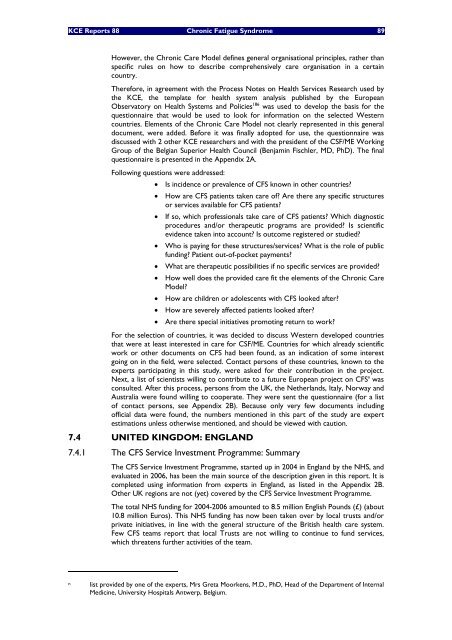Chronisch Vermoeidheidssyndroom: diagnose, behandeling en ...
Chronisch Vermoeidheidssyndroom: diagnose, behandeling en ...
Chronisch Vermoeidheidssyndroom: diagnose, behandeling en ...
Create successful ePaper yourself
Turn your PDF publications into a flip-book with our unique Google optimized e-Paper software.
KCE Reports 88 Chronic Fatigue Syndrome 89<br />
However, the Chronic Care Model defines g<strong>en</strong>eral organisational principles, rather than<br />
specific rules on how to describe compreh<strong>en</strong>sively care organisation in a certain<br />
country.<br />
Therefore, in agreem<strong>en</strong>t with the Process Notes on Health Services Research used by<br />
the KCE, the template for health system analysis published by the European<br />
Observatory on Health Systems and Policies 186 was used to develop the basis for the<br />
questionnaire that would be used to look for information on the selected Western<br />
countries. Elem<strong>en</strong>ts of the Chronic Care Model not clearly repres<strong>en</strong>ted in this g<strong>en</strong>eral<br />
docum<strong>en</strong>t, were added. Before it was finally adopted for use, the questionnaire was<br />
discussed with 2 other KCE researchers and with the presid<strong>en</strong>t of the CSF/ME Working<br />
Group of the Belgian Superior Health Council (B<strong>en</strong>jamin Fischler, MD, PhD). The final<br />
questionnaire is pres<strong>en</strong>ted in the App<strong>en</strong>dix 2A.<br />
Following questions were addressed:<br />
• Is incid<strong>en</strong>ce or preval<strong>en</strong>ce of CFS known in other countries?<br />
• How are CFS pati<strong>en</strong>ts tak<strong>en</strong> care of? Are there any specific structures<br />
or services available for CFS pati<strong>en</strong>ts?<br />
• If so, which professionals take care of CFS pati<strong>en</strong>ts? Which diagnostic<br />
procedures and/or therapeutic programs are provided? Is sci<strong>en</strong>tific<br />
evid<strong>en</strong>ce tak<strong>en</strong> into account? Is outcome registered or studied?<br />
• Who is paying for these structures/services? What is the role of public<br />
funding? Pati<strong>en</strong>t out-of-pocket paym<strong>en</strong>ts?<br />
• What are therapeutic possibilities if no specific services are provided?<br />
• How well does the provided care fit the elem<strong>en</strong>ts of the Chronic Care<br />
Model?<br />
• How are childr<strong>en</strong> or adolesc<strong>en</strong>ts with CFS looked after?<br />
• How are severely affected pati<strong>en</strong>ts looked after?<br />
• Are there special initiatives promoting return to work?<br />
For the selection of countries, it was decided to discuss Western developed countries<br />
that were at least interested in care for CSF/ME. Countries for which already sci<strong>en</strong>tific<br />
work or other docum<strong>en</strong>ts on CFS had be<strong>en</strong> found, as an indication of some interest<br />
going on in the field, were selected. Contact persons of these countries, known to the<br />
experts participating in this study, were asked for their contribution in the project.<br />
Next, a list of sci<strong>en</strong>tists willing to contribute to a future European project on CFS n was<br />
consulted. After this process, persons from the UK, the Netherlands, Italy, Norway and<br />
Australia were found willing to cooperate. They were s<strong>en</strong>t the questionnaire (for a list<br />
of contact persons, see App<strong>en</strong>dix 2B). Because only very few docum<strong>en</strong>ts including<br />
official data were found, the numbers m<strong>en</strong>tioned in this part of the study are expert<br />
estimations unless otherwise m<strong>en</strong>tioned, and should be viewed with caution.<br />
7.4 UNITED KINGDOM: ENGLAND<br />
7.4.1 The CFS Service Investm<strong>en</strong>t Programme: Summary<br />
The CFS Service Investm<strong>en</strong>t Programme, started up in 2004 in England by the NHS, and<br />
evaluated in 2006, has be<strong>en</strong> the main source of the description giv<strong>en</strong> in this report. It is<br />
completed using information from experts in England, as listed in the App<strong>en</strong>dix 2B.<br />
Other UK regions are not (yet) covered by the CFS Service Investm<strong>en</strong>t Programme.<br />
The total NHS funding for 2004-2006 amounted to 8.5 million English Pounds (£) (about<br />
10.8 million Euros). This NHS funding has now be<strong>en</strong> tak<strong>en</strong> over by local trusts and/or<br />
private initiatives, in line with the g<strong>en</strong>eral structure of the British health care system.<br />
Few CFS teams report that local Trusts are not willing to continue to fund services,<br />
which threat<strong>en</strong>s further activities of the team.<br />
n list provided by one of the experts, Mrs Greta Moork<strong>en</strong>s, M.D., PhD, Head of the Departm<strong>en</strong>t of Internal<br />
Medicine, University Hospitals Antwerp, Belgium.

















